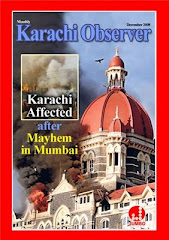
Dec. 30 (Bloomberg) -- Pakistani military chiefs called for an easing of tensions with India triggered by last month’s terrorist attack on Mumbai and a resumption of peace talks between the nuclear-armed neighbors.
Pakistani Army chief General Ashfaq Parvez Kayani, in a meeting with China’s Vice Foreign Minister He Yafei yesterday, “highlighted the need to de-escalate and avoid conflict,” according to a statement from the military.
The call came as U.S. Secretary of State Condoleezza Rice expressed concern over escalating tensions when she spoke by telephone with Pakistani President Asif Ali Zardari and Indian Foreign Minister Pranab Mukherjee, the State Department said.
Pakistan last week reportedly redeployed troops from tribal areas near Afghanistan to the border with India as tensions between the nations mounted. India and Pakistan have fought three wars since independence in 1947, two of them over Kashmir, a Himalayan region divided between them and claimed in full by both.
Rice said that with tensions already high, “neither side should be taking actions that increase” them, State Department spokesman Gordon Duguid told reporters yesterday.
She noted that Pakistan had “made some positive steps but that these steps need to be continuous, that we need to have both sides work together to find the perpetrators of the Mumbai attacks,” according to Duguid.
‘High Alert’
Pakistan has put troops along its eastern border on “high alert” and canceled soldiers’ leave until April, Dawn News Television reported last week.
India ordered a “pause” in the five year peace process after accusing elements in Pakistan of being behind the Nov. 26 29 attacks on Mumbai that killed 164 people. Pakistan has asked for evidence to back up that accusation.
India and Britain have blamed the Mumbai attacks on Pakistan-based Lashkar-e-Taiba. The militant group received weapons and logistical support from Pakistan’s main intelligence agency for attacks in Indian Kashmir in the 1990s, according to Indian and U.S. officials. The group was banned in Pakistan in 2002.
India has demanded Pakistan dismantle terrorist networks operating from its territory and has sought to build global consensus on action against terrorism following the attack.
Pakistan should take “demonstrative” action against terrorists, said Anan Sharma yesterday, India’s junior foreign minister, state-run broadcaster Doordarshan reported.
“India is showing maturity by maintaining restraint, but restraint should not be seen as weakness,” Sharma said.
In talks with He yesterday, Pakistan’s chairman of the Joint Chiefs of Staff Committee General Tariq Majid reaffirmed his country’s commitment to regional peace and cooperation.
Majid “emphasized the need for avoidance of provocative belligerent posturing, initiation of reciprocal measures for immediate de-escalation and earliest resumption of the peace dialogue” during talks with the Chinese envoy.
China is a key ally of Pakistan and He was dispatched to the region two days ago to prod the South Asian nations into resuming dialogue.
Pakistani Army chief General Ashfaq Parvez Kayani, in a meeting with China’s Vice Foreign Minister He Yafei yesterday, “highlighted the need to de-escalate and avoid conflict,” according to a statement from the military.
The call came as U.S. Secretary of State Condoleezza Rice expressed concern over escalating tensions when she spoke by telephone with Pakistani President Asif Ali Zardari and Indian Foreign Minister Pranab Mukherjee, the State Department said.
Pakistan last week reportedly redeployed troops from tribal areas near Afghanistan to the border with India as tensions between the nations mounted. India and Pakistan have fought three wars since independence in 1947, two of them over Kashmir, a Himalayan region divided between them and claimed in full by both.
Rice said that with tensions already high, “neither side should be taking actions that increase” them, State Department spokesman Gordon Duguid told reporters yesterday.
She noted that Pakistan had “made some positive steps but that these steps need to be continuous, that we need to have both sides work together to find the perpetrators of the Mumbai attacks,” according to Duguid.
‘High Alert’
Pakistan has put troops along its eastern border on “high alert” and canceled soldiers’ leave until April, Dawn News Television reported last week.
India ordered a “pause” in the five year peace process after accusing elements in Pakistan of being behind the Nov. 26 29 attacks on Mumbai that killed 164 people. Pakistan has asked for evidence to back up that accusation.
India and Britain have blamed the Mumbai attacks on Pakistan-based Lashkar-e-Taiba. The militant group received weapons and logistical support from Pakistan’s main intelligence agency for attacks in Indian Kashmir in the 1990s, according to Indian and U.S. officials. The group was banned in Pakistan in 2002.
India has demanded Pakistan dismantle terrorist networks operating from its territory and has sought to build global consensus on action against terrorism following the attack.
Pakistan should take “demonstrative” action against terrorists, said Anan Sharma yesterday, India’s junior foreign minister, state-run broadcaster Doordarshan reported.
“India is showing maturity by maintaining restraint, but restraint should not be seen as weakness,” Sharma said.
In talks with He yesterday, Pakistan’s chairman of the Joint Chiefs of Staff Committee General Tariq Majid reaffirmed his country’s commitment to regional peace and cooperation.
Majid “emphasized the need for avoidance of provocative belligerent posturing, initiation of reciprocal measures for immediate de-escalation and earliest resumption of the peace dialogue” during talks with the Chinese envoy.
China is a key ally of Pakistan and He was dispatched to the region two days ago to prod the South Asian nations into resuming dialogue.





















